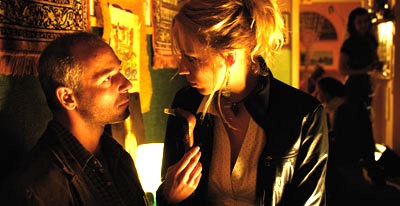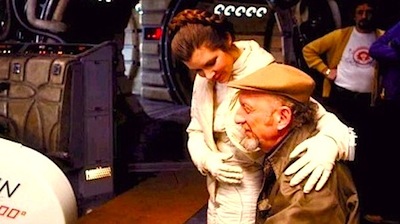By Joe Bendel. Everybody despises collaborators and informers, but what of the secret policemen who press them into betrayal? That is just one of the difficult questions raised by Petr Jarchovsky’s Kawasaki’s Rose, the Czech Republic’s official submission for best foreign language Oscar consideration, which opened Friday in New York at Film Forum.
Pavel Josek was a signatory to Charter 77. A critic of the Communist government’s perversion of psychiatric medicine (his chosen profession), Josek’s dissident credentials are unimpeachable. As a result, he is seen as a logical choice to receive the annual “Memory of the Nation” award for demonstrating moral integrity during the oppressive Communist regime. However, while working on a television documentary on Josek, his estranged son-in-law Ludek (a child of Communist apparachiks) starts to unearth troubling questions about the great man’s early years.
Josek’s wife Jana had once been the lover of Borek, an artist too idiosyncratic and honest to prosper under the Communist system. It begins to look like Josek might have played a small part in the campaign against the sculptor that culminated in his banishment to Sweden.
Whatever Josek did, it was relatively limited and his motives were complicated. He was not, for example, the state security officer stubbing out cigarettes on Borek’s hand. This fellow, known as “Kafka,” apparently pays no price for his crimes, as he smugly dissembles for Radka, Ludek’s television reporter lover. Conversely, Josek starts to slowly twist in the wind.
Martin Huba perfectly captures Josek’s complexity and contradictions in one of the year’s best screen performances. He has scenes discussing the perils of guilt with his mildly delinquent granddaughter that would be fraught with peril for lesser actors. Yet Huba sells them perfectly with his understated world-weariness.

The weak link of the film is unquestionably the marital strife engulfing Ludek and Josek’s daughter, Lucie. Frankly, the confrontation between husband, wife, and mistress makes no sense whatsoever, merely distracting from the more significant drama at hand. Indeed, there is a measure of closure to be found in Rose when the audience finally meets Borek. Spiritually reborn during his time in Sweden, he has befriended Mr. Kawasaki, a Japanese artist who chose a life of self-imposed exile after his entire family was murdered during the 1995 sarin gas terrorist attack on the Tokyo subway.
Though long out of power, the Communist regime continues to cause suffering throughout Rose. Rose is a deeply humane film, but not a completely forgiving one, as evidenced by the bitter irony of its coda. Thoughtful and challenging, Rose is most likely a long shot for Oscar recognition, but it is one of the better films of this award season, well worth seeing at New York’s Film Forum.
Posted on December 1st, 2010 at 1:01pm.


